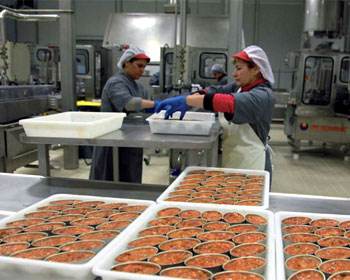|

Canned tuna factory. (Photo: Anfaco)
Tuna industry advocates maintaining current tariff system
 SPAIN
SPAIN
Thursday, September 12, 2013, 01:30 (GMT + 9)
The European Commission (EC) must guarantee "the same playing field in which the EU industry can compete with third countries' industry," and so it must request the fulfillment of the most advanced standards in food safety and labour aspects and in fishing rules. This was again one of the main demands of the EU tuna industry that participated in the VI World Tuna Conference, held in Vigo from 9 to 10 September.
The representatives of the global tuna industry (at fleet and cannery level) who attended the international meeting issued a joint statement in which they emphasize that the tuna occupies a special place among the species caught by the global fishing fleet and is the main product that is manufactured and marketed by the canning industry.
They also highlight the fundamental importance of innovation, development of new products with higher added value and the improvement of the communication of the benefits of canned tuna, the National Association of Manufacturers of Canned Fish and Shellfish (Anfaco - Cecopesca) informed.
The tuna industry is a good example of the globalization of the world economy, and both the tuna industry in Spain and in Europe as well as their investments in third countries, develop their activities respecting community standards to ensure food safety, responsible and sustainable fishing, social protection and occupational safety apart from respect for the environment.
For tuna industrialists, sustainability is essential from the economic, social and environmental viewpoint.
In this context, they note that because the supply of raw materials is a key factor for the competitiveness of the tuna industry, it is necessary to fight against illegal, unreported and unregulated (IUU) fishing.
Furthermore, in order to allow access to canned tuna from third countries to the European market, these nations must fulfill some sine qua non rules: ratify and implement international agreements on human, labour, environment, governance and food security rights.
In addition, the EU tuna industry "considered it was essential to preserve its future competitiveness" that the EC does not grant the benefit of preferential access to the European market for canned tuna from Thailand and Vietnam, among other nations.
This claim arises as a result of negotiations between the EU and these countries to sign bilateral trade agreements.
Anfaco and the EU tuna industry insist that the EC "must safeguard the future of the EU tuna industry and ensure its economic and social development."
And that "inevitably happens as a result of the urgent restoration of the need to comply with the rules of origin in the context of the Economic Partnership Agreement with the Pacific States, and the active defense of this sector in the trade agreements set with third countries."
Related article:
- Galicia canners request 'equality' with Asian competition
By Analia Murias
[email protected]
www.seafood.media
Photo Courtesy of FIS Member  ANFACO-CYTMA - Asociacion Nacional de Fabricantes de Conservas de Pescados y Mariscos (formerly ANFACO-CECOPESCA) ANFACO-CYTMA - Asociacion Nacional de Fabricantes de Conservas de Pescados y Mariscos (formerly ANFACO-CECOPESCA)
|



